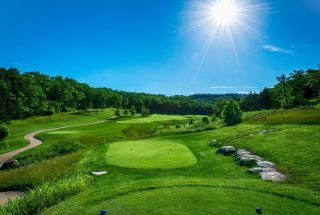Suffolk Golf Course, an 18-hole public golf course in Portsmouth, VA – the first nine holes having been built in 1952 and designed by Dick Wilson – has undergone a green renovation. The course is historically significant from a golf course architecture perspective due to its Dick Wilson design.
“We decided to re-grass the greens to improve both maintenance and playability,” said PGA Professional and Operator, Eddie Luke. “Inevitably, we would have two or three greens die every summer, and we were forced to put up temporary greens, which weren’t very good for business. Players want to play on the turf they see on TV, but most golfers don’t know what goes into achieving that kind of turf on a golf course.”
“I am a big fan of Dick Wilson’s work,” said Lester George, the Golf Course Architect who designed the green renovations. “It is always a treat to work on one of his courses. This is the second of his I’ve had the pleasure to renovate.” Lester George’s primary contribution to the project was to re-establish Dick Wilson’s architectural tenets to the greens. “We made sure the greens conformed to their original size, shape and contour – and this allowed for the restoration of the internal contour to the greens.”
Suffolk Golf Course’s greens are some of the first in Virginia to go from Bentgrass to Bermuda grass, following the lead of many golf courses in North and South Carolina. The Bermuda greens are performing better in the warm summer climate and provide better playing conditions year-round for the patrons. Golf Course Superintendent, Joseph Riddick, was instrumental in the decision to switch to Bermuda grass and recommended that Champion Turf Farms do the installation at Suffolk Golf Course. This grass is very dense and has aggressive lateral growth, recovering from sub-freezing temperatures better than most, and it thrives even in upper transition zone.
George Golf Design was asked to evaluate the feasibility of a Bentgrass to Bermuda grass conversion on what were native soil greens. Golf Course Golf Course Superintendent, Joseph Riddick, and Operator, Eddie Luke, researched this at length. After discussions with Lester, they decided to build one green as a test case in 2012. The test was so successful that the decision to convert the remaining greens was an obvious one.
The USGA came to look at the golf course and concurred with the decision of the owner, superintendent and architect – and further noted the environmental impact of this re-grassing. Suffolk Golf Course is in a watershed, and this new grass will reduce runoff and will require less chemical and pesticide application.
“These newer Bermuda grasses are turning out to be just as good as Bentgrass in warmer climates. They are much more disease resistant and heat tolerant. We will likely see more golf courses converting to Bermuda grass greens. This is a trend-setting move for golf courses to consider as they look to the future of environmental sustainability,” said Lester George. “They are a great turf solution in the transition zone, where the weather is too hot for cool season grass and too cool for warm season grass. We expect the demand for these turf conditions will return Suffolk Golf Course to one of the favorites in the region.”
Contact:
Shannon Fisher, GGD V.P. of Communications, 804-314-3268 or Shannon@georgegolfdesign.com




